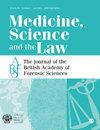The criminalisation of miscarriage associated with illicit substance consumption whilst pregnant.
IF 1.5
4区 医学
Q1 LAW
引用次数: 0
Abstract
The official rights of a foetus continue to be an unending legal and philosophical conversation. Yet newer discussion has emerged on the convictions of mothers for their spontaneous loss of pregnancy. In October 2021, the state of Oklahoma convicted Brittney Poolaw of first-degree manslaughter after the miscarriage of her 15 to 17-week-old foetus and sentenced her to four years in prison. After admitting to methamphetamine and marijuana use during pregnancy, trace quantities of these substances were found in the foetus’ brain and liver on postmortem. However, the report also cited evidence of ‘congenital abnormality ... placental abruption and chorioamnionitis’, all deemed by the medical examiner as ‘conditions contributing’ to miscarriage. As 12–24% of recognised pregnancies result in miscarriage, there is no consistent, investigatory process to consider these as homicides. Currently, a growing adversarial relationship between pregnant women and their foetuses is challenging women’s rights. Between 2006 and 2020, the National Advocates for Pregnant Women (NAPW) identified 1254 cases where women but for their pregnancy, would not have been subject to legal charges. Expanding awareness of prenatal harms questions the expectation for pregnant women to conform to new, scientific discoveries. Can a woman be wrong ‘for drinking coffee or exercising too little, each of which could pose some risk to a fetus’?. There is legal contention on the shifting grounds convicting Poolaw. By ruling miscarriage as manslaughter, the intentional abortion of a foetus could constitute a murder. However, at the time, Oklahoma permitted abortion up to 22 weeks of gestation. Poolaw’s 17-week-old foetus was not viable, and a termination of pregnancy would be legal. Furthermore, criminalising substance abuse whilst pregnant may conversely not protect the health of mother and child as fear of punishment creates a healthcare barrier. In Oklahoma and 24 other states, healthcare providers must report suspected prenatal drug use to police. Yet pregnancy could catalyse a change in mindset, producing a window of opportunity for cessation of recreational drug use that should be harnessed. Some argue incarceration for addiction is the wrong approach for a classified disease, considering the successful approach of Portugal to prioritise the ‘psychosocial vulnerability of high-risk users’ by decriminalising drug use in 2000. Roe v Wade 1973 used to shape a legal framework in the US, meaning states could not outlaw abortion before the point of foetal viability. States could restrict abortion before that point but not inflict ‘undue burden’ on women seeking abortions (Planned Parenthood v Casey 1992). In May 2022, Oklahoma signed the Heartbeat Act – Senate Bill 1503, one of the most restrictive bans across the US. It sidestepped Roe v Wade by using civilian enforcement rather than state officials to criminalise abortion if cardiac activity can be detected. Now the legal basis of Roe v Wade has been overturned by the current Mississippi case in the Supreme Court and loopholes are no longer needed to impede abortion access. The Unborn Victims of Violence Act 2004 recognises foetuses as a legal victim so women can be prosecuted for feticide, chemical endangerment and murder. Cases such as Poolaw’s – guilty of misdemeanour manslaughter by drug possession and consumption, could become a recurring scenario. Conflicting scientific opinion compromises understanding of the effects of foetal exposure to drug use. NAPW strongly states that ‘none of the criminalised drugs are teratogens’ or have not shown to be ‘effective at causing pregnancy loss’. Studies reveal negative effects of cocaine, alcohol and opiates on birthweight, neurodevelopment and the understanding of neonatal abstinence syndrome.11–14 Yet cannabis and methamphetamine are two drugs particularly lacking research. Furthermore, correlation with adverse outcomes does not infer causation.将怀孕期间与非法药物消费有关的流产定为刑事犯罪。
本文章由计算机程序翻译,如有差异,请以英文原文为准。
求助全文
约1分钟内获得全文
求助全文
来源期刊

Medicine, Science and the Law
医学-医学:法
CiteScore
2.90
自引率
6.70%
发文量
53
审稿时长
>12 weeks
期刊介绍:
Medicine, Science and the Law is the official journal of the British Academy for Forensic Sciences (BAFS). It is a peer reviewed journal dedicated to advancing the knowledge of forensic science and medicine. The journal aims to inform its readers from a broad perspective and demonstrate the interrelated nature and scope of the forensic disciplines. Through a variety of authoritative research articles submitted from across the globe, it covers a range of topical medico-legal issues. The journal keeps its readers informed of developments and trends through reporting, discussing and debating current issues of importance in forensic practice.
 求助内容:
求助内容: 应助结果提醒方式:
应助结果提醒方式:


